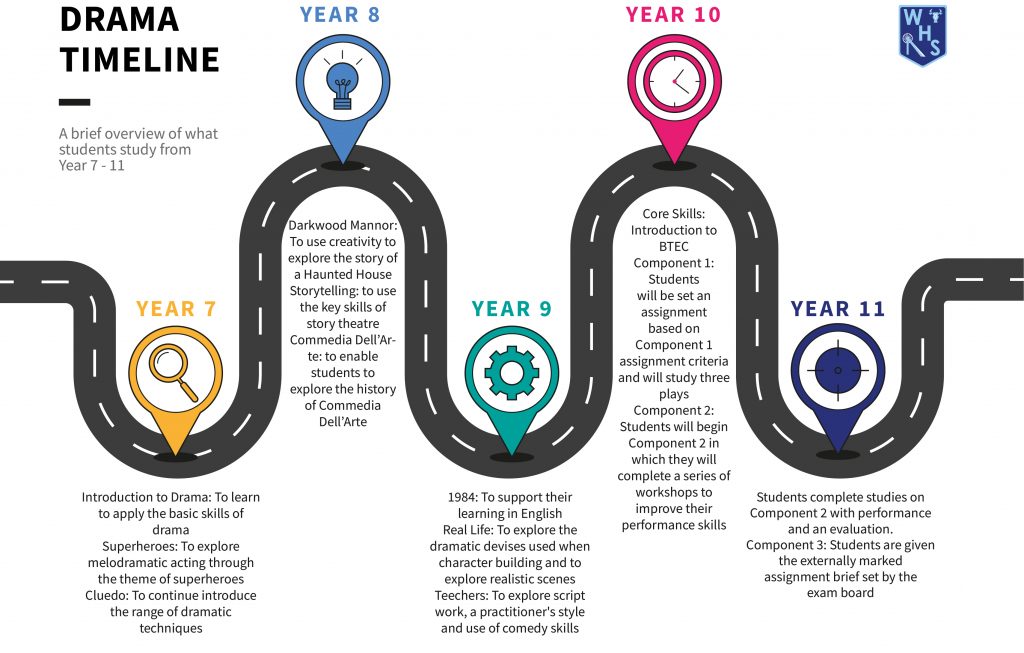Performing Arts – Drama
Within our Performing Arts department, we aim to develop a love of performance and an appreciation of the work of others within the subjects of Drama and Music. Students study both subjects at KS3 and can opt to master the skills and techniques of the subjects further at KS4. The Performing Arts strive to deliver access to opportunity to develop skills that students will need within the subject respectively but also that will serve them far beyond the classroom.
Please see parental overview of Drama below:
The Drama curriculum has been designed to engage and motivate students to achieve with performance whilst appreciating the opinions and approaches of those around them and of those of other cultures within our world, teaching respect for themselves and those around them. It challenges our students to think differently about the world around them and gives them a chance to explore these differences expressively as they learn look after each other. Students are required to create, perform, and evaluate work which will allow them to become active and purposeful citizens of both within our community and the world. Students are expected to articulate and present their ideas with confidence which prepares them for the working world. Each topic is designed to teach students the skills and techniques of the subject and enjoy their learning as they explore themes and topics using these skills and techniques.
Within Drama, we proudly showcase each voice, each viewpoint and provide a safe platform for students’ expression and individuality which enables students to aim high. We develop student expertise in spoken language and listening skills in-line with the national curriculum in English to reinforce and strengthen the spoken and written word through performance developing the key skills and competences.
At Westhoughton High School our Performing Arts curriculum is designed to reflect our school LEARN ethos:
Look after each other – Watching each other perform respectfully and offering each other feedback on what went well and what could be even better fosters an ethos of positivity within the Performing Arts classroom
Enjoy our school – Performing Arts offers and different way for students to express themselves and equips them with a range of skills to use across the curriculum and within extracurricular opportunities such as the school production, creating lifelong memories
Aim high – Students are encouraged to challenge themselves in lesson, creating characters that are different to them and performing to their peers
Respect ourselves, each other and our school community – The Performing Arts as a subject requires high levels of respect from our students due to the nature of performing to each and introduces them to a range of different cultures and issues, teaching them to respect others beyond our school gates.
Never stop learning – New learning in introduced in each topic equipping our students with a range of different skills and techniques to apply to performance work each lesson.
Our learners are equipped to work towards the mastery of skills required to create and perform their own pieces of performance work through the following stages:
- Exploring the core skills and values of leadership, confidence, teamwork, communication and problem-solving with an ethos around the idea that we never stop learning.
- Students are encouraged to use standard English confidently in a range of formal and informal contexts, including classroom discussion.
- Participating in structured discussions, sharing their own ideas, summarising and/or building on what has been said whilst looking after each other through supportive conversation.
- Improvising, rehearsing, and performing play scripts to enjoy their learning through a different way of expressing their knowledge and understanding.
- Embedding of verbal skills for self and peer feedback which students master over the course of the curriculum ensuring they respect themselves and those around them.
- Applying the basic skills of performing – use of voice, body language and facial expressions.
Please see parental overview timeline of the course in KS3 and KS4 below:
Links for Support/Help at Home
- Participation in dramatic productions, groups or activities outside of school
- Theatre trips and experiences
- Key terminology word banks displayed around the home
- Reading! Notably reading books or plays that have been turned into theatre performances or films
- Develop a love of performance and introduce a range of genres
- Encourage your child to participate in enrichment/extra-curricular clubs inside or outside of school (including dance club within PE)
- Visit exhibitions
- Visits to festivals or concerts and attendance/participation in school productions and performances
- Use of additional homework booklets, therapy work packs and/or additional resources from the class teacher via Synergy
- Use of student resources located within WHS SharePoint for students
Extracurricular clubs are further opportunities for our students to develop their performance skills and showcase their talent. Clubs include a choir for all age groups, a band group and Year group drama clubs which support further development and skill acquirement for our students. Full school productions are run twice a year at Christmas and during the summer term to encourage and foster as love of performing within our school community. Theatre and musical trips are also held to enable our students to experience the arts in practice and work alongside others from outside our school population sharing a passion for performance.


